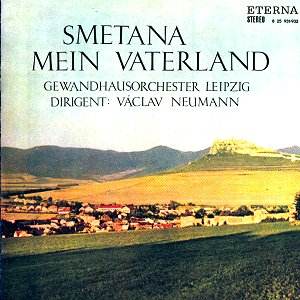The recording date in Berlin Classics’ documentation – confined
to brief descriptive paragraphs about the music - is given as 1968 but
I wonder if it’s not 1967, the last year of Vaclav Neumann’s period as
conductor of the Leipzig Gewandhaus Orchestra and as general music director
of the Leipzig Opera. The following, fateful year saw him back in Prague
as chief conductor of the Czech Philharmonic. As an envoi to his period
of success in Leipzig, notably the famous Falsenstein production of The
Cunning Little Vixen, his Ma Vlast is a loving, leisurely and
warm interpretation.
Too leisurely in fact and one of the least athletic
traversals I’ve heard. When he re-recorded Ma Vlast in Prague
a few years later – in 1975 with the Czech Philharmonic – he was slightly
to rethink the individual tone poems and in every case a process of
tightening up occurred. But the extent of that structural re-evaluation
was really negligible in the context of his conception of the cycle
as a whole and it remained consistently the case that Neumann’s view
differed fundamentally from that of his august predecessors and indeed
from that of many of his Czech conducting contemporaries. Which is,
in and of itself, no bad thing necessarily. But compare Neumann’s Vyšehrad
with Kubelík eight or nine years earlier or Ancerl from 1963
and their immediacy and tension and sheer incisiveness register that
much more viscerally – as indeed do their identical timings, a minute
and a half quicker than Neumann. Neumann’s relative heaviness manifests
itself in Vltava – Ancerl wasn’t much slower, judged by the stopwatch,
but his accents are better pointed, his rhythmic flexibility is more
pronounced; Neumann by comparison is quite distended, trumpets poorly
balanced in the concluding peroration and the otherwise fine playing
put to the service of a rather lethargically flowing river. Talich was
always a proponent of relatively quick tempi here but not even could
quite match the young Kubelik’s 78s of Vltava and From Bohemia’s
Woods and Fields – the only parts of the cycle issued and blazingly
passionate. Šárka, as if to belie Neumann’s reputation
for over comfortable tempi, is in sheer contradistinction emphatically
aggressive and fast, but From Bohemia’s Woods and Fields is just
too flaccid, uninflected and stodgy ever to swell and crest the melodies
as had, say, Talich, Kubelik, Ancerl and the neglected but magnificent
Otakar Jeremiáš, before him. Tábor and Blaník
observe the same relative properties as most of the rest of the cycle
– a rather restrained, lax and indulgent perspective. Again it would
be tempting to see this as an over nostalgic view of home from abroad
but his Czech performance is much the same, only slightly quicker.
I can’t pretend that this is an interpretation that
will detain most lovers of Ma Vlast. Even in Czech terms it occupies
a distinct place – deliberate, avuncular, relatively somnambulant –
that is in oppositional conflict to the vivid and dramatic surge of
Talich, Jeremiáš and Kubelík. If you like your Ma Vlast
on the distended side, though, maybe eighty minutes with Neumann is
time well spent.
Jonathan Woolf


